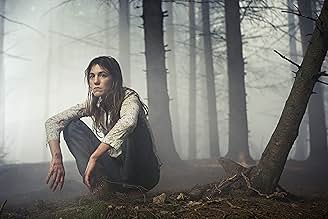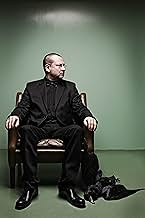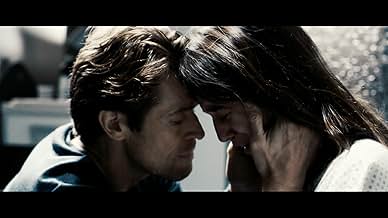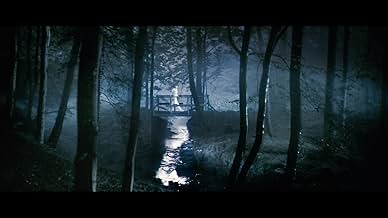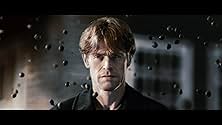Una pareja afligida se retira a su cabaña en el bosque, con la esperanza de reparar sus corazones rotos y su matrimonio problemático, pero la naturaleza sigue su curso y las cosas van de mal... Leer todoUna pareja afligida se retira a su cabaña en el bosque, con la esperanza de reparar sus corazones rotos y su matrimonio problemático, pero la naturaleza sigue su curso y las cosas van de mal en peor.Una pareja afligida se retira a su cabaña en el bosque, con la esperanza de reparar sus corazones rotos y su matrimonio problemático, pero la naturaleza sigue su curso y las cosas van de mal en peor.
- Dirección
- Guionista
- Elenco
- Dirección
- Guionista
- Elenco
- Premios
- 21 premios ganados y 33 nominaciones
- Dirección
- Guionista
- Todo el elenco y el equipo
- Producción, taquilla y más en IMDbPro
Argumento
¿Sabías que…?
- TriviaThe Sound Engineer actually swallowed a microphone and recorded the inner audio of his body in order to achieve certain similar sounds for the film.
- ErroresIn the end titles, George Frideric Handel's piece "Lascia ch'io pianga" is wrongly listed as "Laschia ch'io pianga".
- Citas
Fox: Chaos reigns.
- ConexionesFeatured in At the Movies: Cannes Film Festival 2009 (2009)
- Bandas sonoras'Lascia ch'io pianga' from 'Rinaldo'
Composed by George Frideric Handel (as Georg Friedrich Händel)
Performed by Tuva Semmingsen and Barokksolistene
Opinión destacada
Down the road from me is a coven of Christian filmmakers. It is a school and the purpose is to make films that evangelize. This fascinates me; generally their stories are about fighting the devil, a narrative that encompasses both what is in the film and what surrounds the making of the film. Some day, they might make engaging films and who knows what will happen.
This interests me because most movies are made by professional storytellers. Scorcese and Fincher (for example) not only makes a wide variety of stories, but they deliberately do so. The connection with their lives is — with few exceptions — with the art. Most singers are this way as well. Connected with this is films that have a love story that features a woman the male filmmaker is in love with. This often grabs me.
Now here we have a man deeply depressed, possessed. He makes a film painfully pulled from his soul, so difficult in the making that he is suicidal. It works. It is so deeply disturbing that I caution you to stay away from it. I was a bit vulnerable when encountering this world and it affected me.
Lars von Trier has built a life making films that exploit experiments in convention. I find them interesting, but there is always an academic distance that keeps them from connecting. They engage for how they are made, not what they are. At each juncture, I wonder how powerful a film might be if he used what he knows to communicate, rather than to practice. Now I know. He was so depressed he simply made. Looking at the usual areas where he is disciplined, you can see he is sloppy. Everything is imprecise. There is no theory at work here. Where it is technically competent, it is only temporarily so. That is what makes it so, so very powerful. His gush of expression floods past his constraints of Danish discipline.
The story is identical to "Don't Look Now." We as viewers think we see a child lost, and follow a couple in a grief that swallows them. But we see it from the husband's untrusted eye. He is confused, haunted, magically twisted through the sexual magic he and we see but which permeates and guides the narrative. This is a tornado of witchcraft, like the Roeg film, but from a filmmaker within it. Causal mechanics are not what we think we know from the beginning. The shoes are reversed. I do not know from outside sources what caused his depression, but it is pretty clear from this desperate message from within.
There are some pretty powerful images here. Some involve genitals, an ordinarily off-limits zone. Some involve a graceful death of an infant, made more terrifying by the beauty in which we receive it. Some involve damaged animals. Each of these is amplified by the rush of emotional confusion, the onanistic waterfall of acorns on the tin roof. Experience this at your peril.
The actors are incredible.
Ted's Evaluation -- 3 of 3: Worth watching.
This interests me because most movies are made by professional storytellers. Scorcese and Fincher (for example) not only makes a wide variety of stories, but they deliberately do so. The connection with their lives is — with few exceptions — with the art. Most singers are this way as well. Connected with this is films that have a love story that features a woman the male filmmaker is in love with. This often grabs me.
Now here we have a man deeply depressed, possessed. He makes a film painfully pulled from his soul, so difficult in the making that he is suicidal. It works. It is so deeply disturbing that I caution you to stay away from it. I was a bit vulnerable when encountering this world and it affected me.
Lars von Trier has built a life making films that exploit experiments in convention. I find them interesting, but there is always an academic distance that keeps them from connecting. They engage for how they are made, not what they are. At each juncture, I wonder how powerful a film might be if he used what he knows to communicate, rather than to practice. Now I know. He was so depressed he simply made. Looking at the usual areas where he is disciplined, you can see he is sloppy. Everything is imprecise. There is no theory at work here. Where it is technically competent, it is only temporarily so. That is what makes it so, so very powerful. His gush of expression floods past his constraints of Danish discipline.
The story is identical to "Don't Look Now." We as viewers think we see a child lost, and follow a couple in a grief that swallows them. But we see it from the husband's untrusted eye. He is confused, haunted, magically twisted through the sexual magic he and we see but which permeates and guides the narrative. This is a tornado of witchcraft, like the Roeg film, but from a filmmaker within it. Causal mechanics are not what we think we know from the beginning. The shoes are reversed. I do not know from outside sources what caused his depression, but it is pretty clear from this desperate message from within.
There are some pretty powerful images here. Some involve genitals, an ordinarily off-limits zone. Some involve a graceful death of an infant, made more terrifying by the beauty in which we receive it. Some involve damaged animals. Each of these is amplified by the rush of emotional confusion, the onanistic waterfall of acorns on the tin roof. Experience this at your peril.
The actors are incredible.
Ted's Evaluation -- 3 of 3: Worth watching.
- tedg
- 21 ene 2011
- Enlace permanente
Selecciones populares
Inicia sesión para calificar y agrega a la lista de videos para obtener recomendaciones personalizadas
- How long is Antichrist?Con tecnología de Alexa
Detalles
- Fecha de lanzamiento
- Países de origen
- Idioma
- También se conoce como
- Antichrist
- Locaciones de filmación
- Productoras
- Ver más créditos de la compañía en IMDbPro
Taquilla
- Presupuesto
- USD 11,000,000 (estimado)
- Total en EE. UU. y Canadá
- USD 404,122
- Fin de semana de estreno en EE. UU. y Canadá
- USD 71,397
- 25 oct 2009
- Total a nivel mundial
- USD 7,426,176
- Tiempo de ejecución1 hora 48 minutos
- Color
- Mezcla de sonido
- Relación de aspecto
- 2.35 : 1
Contribuir a esta página
Sugiere una edición o agrega el contenido que falta

Principales brechas de datos
What is the streaming release date of Anticristo (2009) in Australia?
Responda



